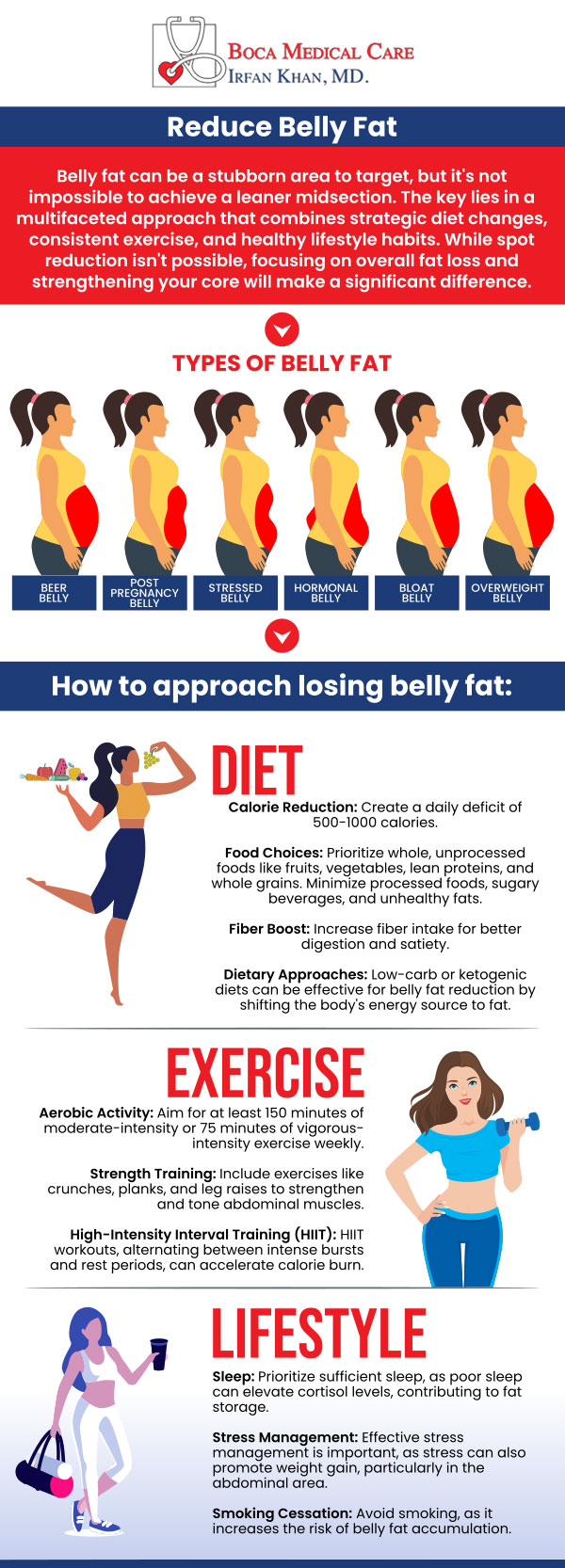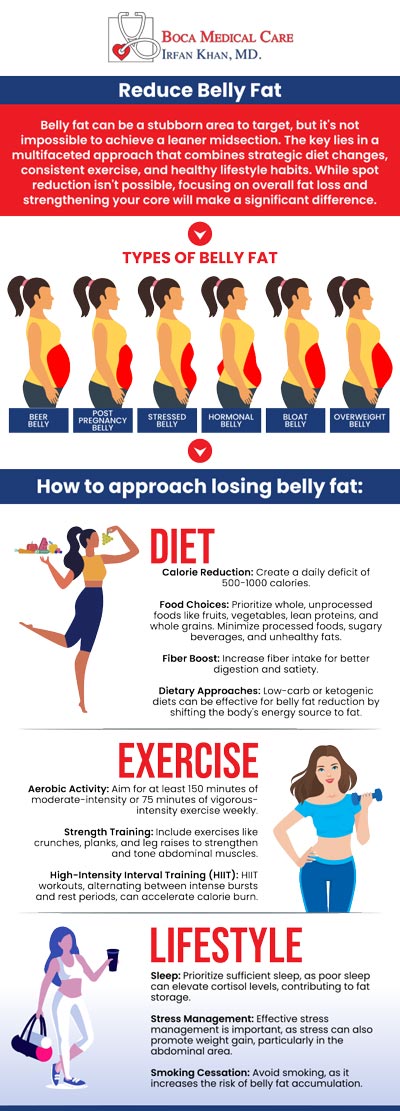The Impact of Sugar on Belly Fat and How to Curb Sugar Cravings
Excessive sugar consumption contributes to the accumulation of belly fat, leading to various health risks. Dr. Irfan Khan, MD, at Boca Medical Care, explains how sugar impacts insulin levels and promotes fat storage, particularly around the abdomen. Curbing sugar cravings through mindful eating and healthier alternatives can significantly reduce belly fat and improve overall health. Taking control of your sugar intake today can lead to lasting health benefits. For more information, please contact us now or request an appointment. Boca Medical Care is conveniently located at 9250 Glades Rd #110 Boca Raton, FL 33434.


Table of Contents:
How does sugar contribute to belly fat?
Can cutting out sugar help reduce belly fat?
What types of sugar are the most problematic for belly fat?
How does sugar affect metabolism and fat-burning?
From Sweet Tooth to Slimmer Waist: Dr. Irfan Khan’s Sugar Strategy
We prioritize your long-term health and well-being. One important area we focus on with our patients is the impact of sugar on overall health—especially how it contributes to the accumulation of belly fat and related medical conditions.
Consuming foods and beverages high in added sugars, such as sodas, sweet snacks, and processed foods, causes your blood sugar to spike quickly. This prompts your pancreas to release insulin, which helps your body process the sugar. However, when sugar intake remains high over time, insulin levels can stay elevated, which may eventually lead to insulin resistance. This is a key factor in the development of abdominal (belly) fat.
Belly fat, particularly the type called visceral fat that surrounds your internal organs, is more than just a cosmetic concern. Medical research demonstrates a strong link between visceral fat and increased risk for serious health problems, such as type 2 diabetes, heart disease, and chronic inflammation—all of which we screen for and help manage here at Boca Medical Care.
Sugary foods and drinks are high in calories but low in nutrition, making it easy to overeat and gain weight without feeling satisfied. Furthermore, excess fructose—found in table sugar and high-fructose corn syrup—is processed in the liver and can be directly turned into fat, further increasing abdominal fat stores.
At Boca Medical Care, we understand that managing weight—especially belly fat—can be challenging. One effective strategy we often discuss with our patients is reducing sugar intake. Here’s why this is important and how it can benefit your health:
Excess sugar, particularly from sweetened beverages, desserts, and processed foods, adds unneeded calories to your diet. When you consistently consume more calories than your body uses, the surplus is stored as fat—commonly around the abdomen. This type of fat can increase your risk for serious health conditions, including type 2 diabetes and heart disease.
Sugar doesn’t just add calories—it also affects your body’s insulin levels. Eating high-sugar foods causes your blood sugar and insulin levels to spike. Over time, chronically high insulin can encourage fat storage in your belly and may even lead to insulin resistance, a key factor in the development of metabolic disorders.
By cutting out or significantly reducing sugar, our patients often see a reduction in their overall calorie intake, which helps promote fat loss. Lower sugar intake also helps stabilize blood sugar and insulin levels, making it easier for your body to burn stored fat for energy.
However, we know that long-term success comes from a comprehensive approach. Reducing sugar is just one piece of the puzzle. We encourage our patients to combine dietary changes with regular physical activity, sufficient sleep, and healthy stress management. Together, these habits can make a significant difference in reducing belly fat and improving your overall well-being.
At Boca Medical Care, we’re dedicated to helping our patients achieve and maintain optimal health—including a healthy weight and reduced risk for metabolic disease. One important factor in managing belly fat is understanding the different types of sugar in your diet and how they affect your body.
Added Sugars and Abdominal Fat
Our team at Boca Medical Care often counsels patients about the impact of added sugars—those incorporated into foods and drinks during processing or preparation. These sugars, commonly found in sodas, candies, pastries, and other packaged foods, are rapidly absorbed by the body. This leads to spikes in blood sugar and insulin levels, which can promote fat storage, especially around the abdomen.
High-Fructose Corn Syrup: A Key Concern
We pay particular attention to high-fructose corn syrup, a common sweetener in many processed foods and beverages. When consumed in excess, fructose is metabolized in the liver and can be converted to fat more readily than glucose. This process is linked to increased visceral fat—the “hidden” fat stored around internal organs that’s associated with higher risks of heart disease, diabetes, and other metabolic disorders.
Liquid vs. Whole Food Sugars
We also educate patients about the difference between sugars in liquid and solid forms. Sugary drinks (like soft drinks and fruit juices) do not provide the same feeling of fullness as whole foods, making it easier to consume too many calories and contributing to belly fat. In contrast, the natural sugars in whole fruits and vegetables are less concerning, as these foods also provide fiber, water, and essential nutrients that slow sugar absorption and support overall health.
We frequently counsel our patients on the crucial role nutrition plays in overall health, especially when it comes to metabolic function and weight management. One of the most significant dietary factors affecting your metabolism is sugar, particularly in the form of simple carbohydrates like glucose and fructose.
When you eat foods high in sugar, your blood glucose rises rapidly. In response, your pancreas releases insulin—a hormone that helps your cells absorb glucose for energy or storage. While insulin is vital for regulating blood sugar, consistently high insulin levels can actually inhibit the breakdown of fat (a process called lipolysis) and encourage your body to store more fat in adipose tissue.
This is especially relevant for patients struggling with weight loss, prediabetes, or metabolic syndrome. We see firsthand how frequent sugar consumption can keep insulin levels elevated. When this happens, your body prioritizes burning sugar for energy, suppressing your ability to burn stored fat. Over time, this can contribute to insulin resistance, where your cells become less responsive to insulin—making it even harder to lose weight and increasing your risk for type 2 diabetes.
Are relentless sugar cravings hindering your health goals? Dr. Irfan Khan, MD, at Boca Medical Care offers the expertise to break free and target harmful belly fat. Dr. Khan understands that sugar’s impact goes beyond simple calories, driving a cycle of high insulin and visceral fat accumulation that raises the risk of chronic disease. As part of his comprehensive weight management approach, Dr. Khan equips patients with practical tools to stabilize blood sugar, including meal planning that emphasizes whole foods, and provides clinical support to quiet the biological drivers of cravings, empowering them to achieve significant, sustainable fat reduction. For more information, please contact us now or request an appointment. Boca Medical Care is conveniently located at 9250 Glades Rd #110, Boca Raton, FL 33434. We serve patients from Boca Raton FL, Kings Point, FL, Delray Beach FL, Deerfield Beach FL, Pompano Beach FL, Highland Beach FL, and surrounding areas.
Check Out Our 5 Star Reviews


Additional Services We Offer
▸ Medical Marijuana
▸ Medical Weight Loss
▸ Immigration Physical
▸ Workers Comp
▸ Internal Medicine
▸ Telemedicine Visits
▸ Ozempic Injection
▸ Vaccination
▸ IV Therapy
▸ Semaglutide GLP-1 Injections
▸ Vitamin B12 Shots
▸ Hormone Testing
▸ Joint Pain
▸ BHRT

Additional Services We Offer
▸ Medical Marijuana
▸ Medical Weight Loss
▸ Immigration Physical
▸ Workers Comp
▸ Internal Medicine
▸ Telemedicine Visits
▸ Ozempic Injection
▸ Vaccination
▸ IV Therapy
▸ Semaglutide GLP-1 Injections
▸ Vitamin B12 Shots
▸ Hormone Testing
▸ Joint Pain
▸ BHRT


